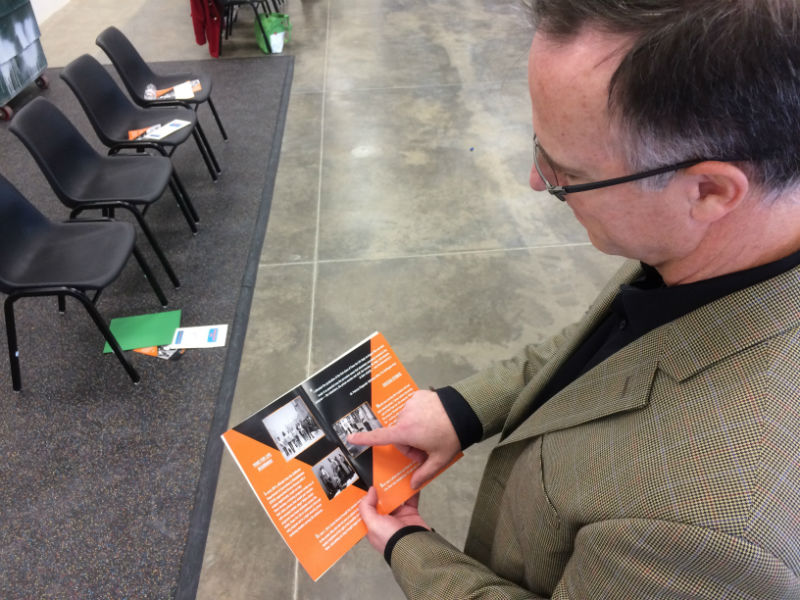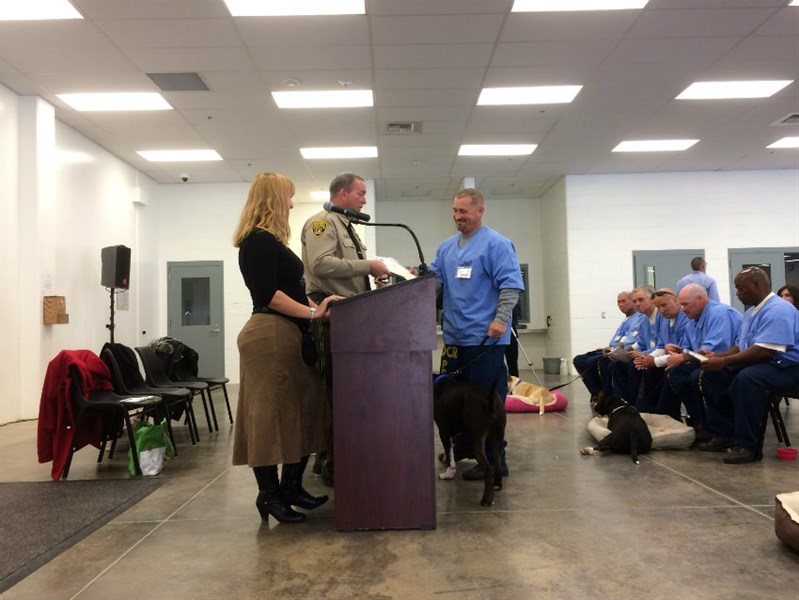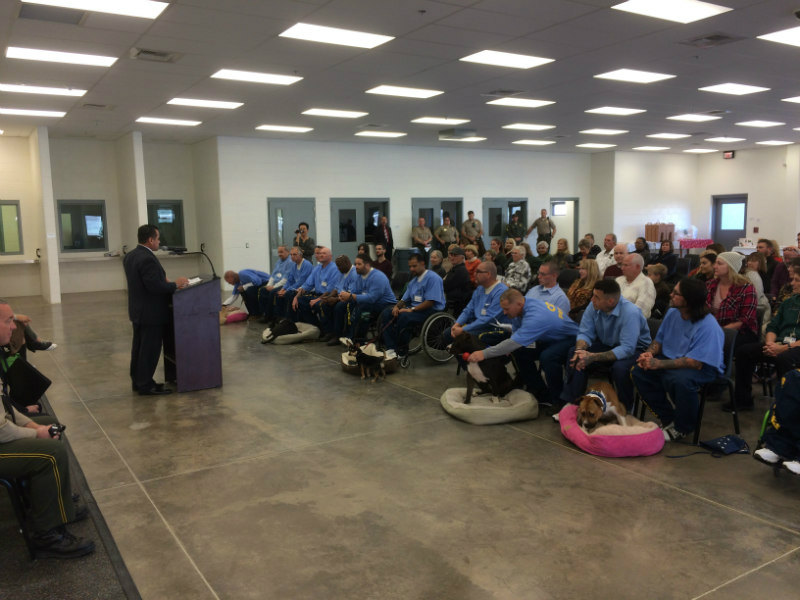The people behind a new program at a northern California prison say inmates and rescue dogs can work together to change each other's lives.
Late last year, Mule Creek State Prison in Ione introduced the Paws For Life program to its inmates and selected 13 to train five dogs with the goal of making the animals adoptable.
>
Keith Bonnet is a recovering drug addict and is in prison for armed robbery.
"Lilly" is a blonde Anatolian Shepherd mix with black and white markings.
Keith says prison saved his life. Now, he hopes to save Lilly's by training her to be an adoptable house pet.
Lilly obeys most of Keith's commands. For the time being, he gives her a pass for not wanting to roll over. In the big picture, it's her training to be sociable and a good pet that is most important.
That's what makes her adoptable.
According to Keith, the program has had as much of an effect on him as it has had on the dog.
"I think I've met my calling. I've been having sleepless nights thinking about everything I want to do when I get out. I get out in a couple of years. You know, I committed a crime. I'm in prison. I deserve to be here. But, I feel like this is giving back and I want to spend the rest of my life giving back," he says.
The prisoners are in a new wing at Mule Creek that houses inmates with significant medical and mental health diagnosis.
Alex Tonner directs the program for Karma Rescue. It's a nonprofit based in Los Angeles. The organization first tried the program in Lancaster and has now expanded to Mule Creek.

Troy Fennel heads education services for the CDCR. He points to a picture of a dog he adopted that came from the Lancaster State Prison Paws For Life program. Bob Moffitt / Capital Public Radio
She says inmates must meet eligibility and behavioral requirements.
"They have to be able to work together as a team. They're going to be approached by a lot of people in the facility and it's not all going to be on a positive note," Tonner says. "They have to be approachable. They have to curb their emotions. They have to just be forward thinkers. Everyone that we chose for this program, for this first round were qualified, highly qualified."
Some hadn't considered themselves "highly qualified." James Mooso is in the 37th year of a life sentence with the possibility of parole for kidnapping, robbery and attempted murder. He helps train Batman, a black and tan Chihuahua with big ears. Treatment-wise, there's a similarity between man and dog.
"At first I was afraid, because I've never been in a program where I had to take care of something. My clinician talked me into signing up for the program. She told me that it would be good for me and my mental health," he says.
"The dogs, they come in, they're kind anxious, worried, and some of them are kind of snappy. You work with gradually getting used to being around other people, settin, standing, speaking, using the potty area, doing all that stuff correctly."
Twelve weeks after the dogs arrived, they are graduating. Family, friends, and staff applaud as the inmates receive their certificates.

Joshua Metcalf and Webber receive their certificates of completion from Captain Buckner at Mule Creek State Prison. Bob Moffitt / Capital Public Radio
Joshua Metcalf has served 26 years for second-degree murder. He says other programs helped him become a better person, but a pitbull mix named Webber helped bring people together.
"Everybody in here got so concerned with the dogs that they took priority over our own needs, our own wants, our scheduling. It was something that was, it made you proud. Then you realized it wasn't just about the dogs. People also understood that other people were concerned about their dogs. So, there's empathy, this feeling for other people, started to grow and grow," he says.
Then, his voice wavers: "Right now, I'm about to cry, because my mom's crying. It's an amazing program. To be able to feel for somebody else and to be open to that type of reward is unlike anything we could possibly think about in prison and I want to thank all of you. Thank you very much."
Joe Lizarraga is the warden at Mule Creek. He says the program has improved the relationships between the guards and many of the inmates.
"It's built a bridge between not only between the inmates themselves as they communicate about the dogs and talk about the dogs, which, they normally may not even speak, the same thing with the staff. It builds a bridge to communication. You have staff asking about the dogs, you have staff asking about the training and they too are involved in the process and it's just great all the way around for our goals of rehabilitation."

Mule Creek State Prison Warden Joe Lizaragga addresses inmates, inmates' families and staff involved with the Paws For Life program. Bob Moffitt / Capital Public Radio
Jay Gibson is serving a 23-year term for voluntary manslaughter and arson. He is training a black and white lab mix named Jewels. He says the program is not only a chance at rehabilitation, but also, redemption.
"If people can look in the mirror and have different thoughts from the everyday stuff is here in prison, they think of freedom, they think of dogs, they think of family member and love and things that are sparking up inside of us is going to help the community because the people will change here before they get outside and that way when they walk outside. Maybe they will continue that help and sharing and focus on their lives and have meaning and a little responsibility and give back to society what we neglected to begin with."
The Paws For Life Program costs about $150,000 for trainers, supplies, and food. Karma Rescue and CDCR say they hope to introduce the program into a juvenile facility this year and expand it to other prisons when funding becomes available.
The prison also has an 18-month program for service dogs. Those animals go to the homes of veterans and autistic children.
Follow us for more stories like this
CapRadio provides a trusted source of news because of you. As a nonprofit organization, donations from people like you sustain the journalism that allows us to discover stories that are important to our audience. If you believe in what we do and support our mission, please donate today.
Donate Today